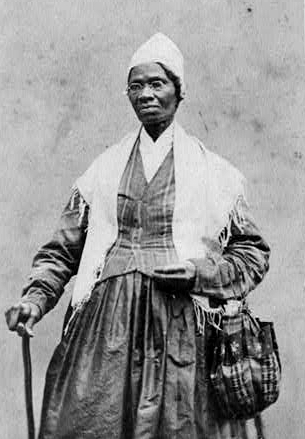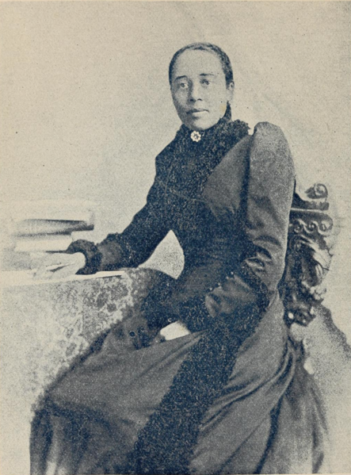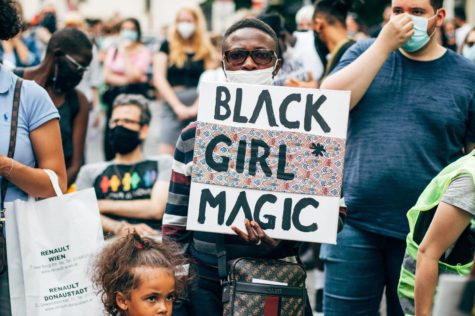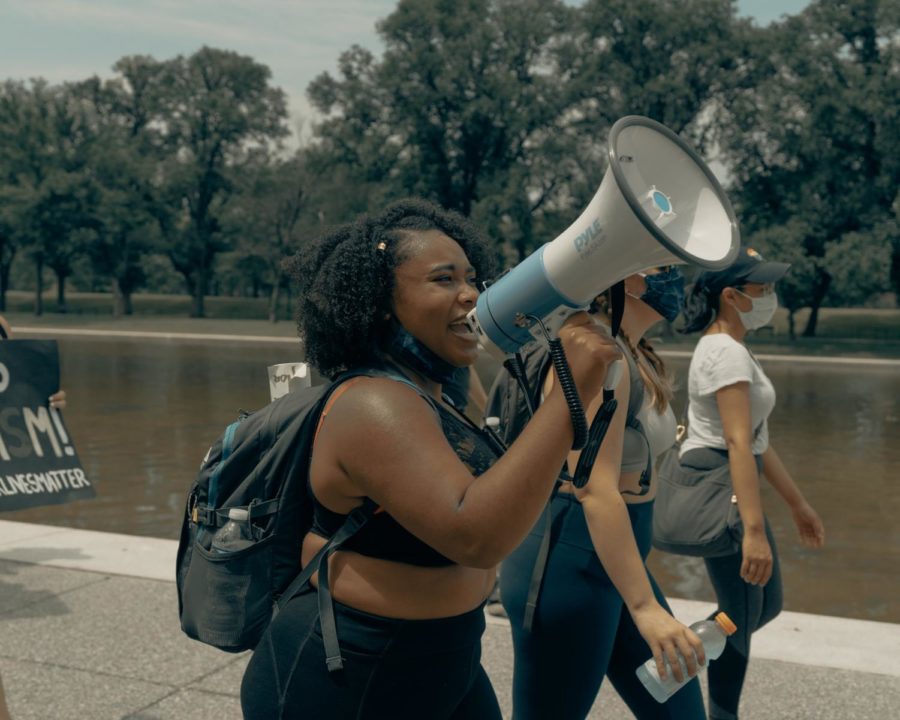The Importance of Black Feminism
Time and again, Black women’s contributions to society continue to be disregarded. The solution to this systemic issue? Black feminism.
Black feminism encourages women to chant with megaphones and lead crowds instead of marching behind or on the adjoining street.
History is a long string of problems and solutions. The twentieth century, for example, was a period of life-changing inventions, trailblazing films, and good old American progress. But under the blinding lights of success lay harsh disenfranchisement and injustice toward women and the African American community. The Women’s Suffrage and Civil Rights movements produced legislative remedies to the systemic issues, but even these movements perpetuated an underlying problem: the dismissal of Black women. The solution to this dismissal became the ever-changing, multi-faceted movement that is Black feminism.
One of the main points Black feminism seeks to address is intersectionality, a term coined by civil rights advocate Kimberlé Crenshaw. Generally, intersectionality conveys how a group that has multiple layers of identity can experience multiple levels of social injustice. For example, if the universe decided to take all of the discriminated men and women of the world and group them by factors that cause their experiences of prejudice, such as race or gender, Black women would not know where to step.
If a Black woman decided that her race was the root of her problems, she would fail to recognize that being a woman could be why she didn’t receive the promotion she deserved. And if she believed that being female was the sole reason for her shortcomings, she would not acknowledge that she possibly didn’t get the loan she qualified for because of her Blackness. The double repercussions of identifying as both Black and a woman form multiple overlapping layers of varying experiences pertaining to discrimination, causing a tug-of-war of identity and sociological confusion.
Attempting to put African-American women in a singular frame has neglected their struggles due to the overlap between Blackness and femininity. As a result, these women have slipped through the cracks of our consciousness and are barely heard on the news or mentioned in textbooks. This phenomenon is depicted in the Women’s Suffrage and the Civil Rights movements, which both fought for equal rights while dismissing the contributions of Black women, who have experienced the struggles of both worlds.
In calculated efforts to gain southern support for the movement, many white suffragists excluded Black women from joining their fight and did not condemn the disenfranchisement of African Americans at the time. Elizabeth Cady Stanton, a notable Women’s Suffrage leader, assented to racist attitudes by supporting the idea that Congress should have prioritized white women over Black men in getting the right to vote. “In regards to the Women’s Suffrage movement,” said Ms. Keisha Jones, a social worker at Bronx Science, “one of the reasons that women sought the right to vote in this country was because Black men had gotten it first.”
White suffragists also prevented African American women from attending many of their events, forcing them to march behind the crowd in women’s rights parades. Even in the Seneca Falls Convention of 1848 — the first women’s rights convention in the United States — not a single Black woman was invited; Fredrick Douglass, a man, was the only African American in attendance. The racial schism within the movement became intense enough that white suffragists began to ask: “How do we advocate for ourselves without minimizing the needs of others?” Unfortunately, this was never adequately addressed in the movement, explained Ms. Jones. Although they faced overt discrimination within the Women’s Suffrage movement, Black women rejected any attempts to suppress their voices and continued to advocate for gaining the right to vote.

Many women laid the groundwork for Black feminism long before it was named or conceptualized. Formerly enslaved activist and abolitionist Sojourner Truth advocated for Black women at the 1851 Women’s Rights Convention with her notable “Ain’t I A Woman” speech, where she heavily criticized sexist ideology and declared that voting rights were human rights.
Anna Julia Cooper, one of the most noteworthy scholars in the United States, championed the rights of Black women by penning a collection of thoughtful-provoking essays and speeches called A Voice From the South (1892). In it, Cooper offers one of the first clear articulations of Black feminism and insists that equality for Black women would advance the entire African American community. This granted her the title of the Mother of Black feminism.

Eventually, roughly seventy years later, women could proudly walk up to the polls and cast their ballots with their heads held high. However, the African American community was not so lucky. Even though the 15th Amendment, ratified in 1870, prohibited states from denying citizens the right to vote on the premise of race, two pitfalls resulted in the legislation’s failure to combat voting discrimination.
The first failure was sex. The 15th Amendment barred states from voting discrimination based on “race, color, or previous condition of servitude,” failing to recognize “sex” as a factor of disenfranchisement and asserting that African American women did not deserve the right to vote. The second was that America simply did not care. The vague wording in the 15th Amendment created loopholes that allowed states to conjure dozens of discriminatory tactics to suppress Black voter turnout, which suffered due to the poll tax and the grandfather clause, in addition to the Jim Crow laws, intimidation, and violence.
These horrifying realities of the Black community only ceased with numerous victories that resulted from the Civil Rights movement, including the Voting Rights Act of 1965, which finally dismantled state-regulated practices that restricted African Americans’ access to voting. The prohibition of race-based voter discrimination can be accredited to the tireless efforts of the heroes of the Civil Rights Movement; however, most of them remained invisible and overshadowed by sexism, which ran rampant throughout the movement.
Understanding that the only female Civil Rights activist celebrated is Rosa Parks is no coincidence. Black women were shunned from the spotlight due to gender expectations instead of racial tensions present in the Women’s Suffrage movement. Unfortunately, the Civil Rights movement reflected the sexist gender roles and expectations present in American culture. For instance, tens of thousands of women were present during the March on Washington in 1963, but none were asked to speak directly to the crowd. They were even asked to march on the adjoining street, a tactic used to keep them in the background, leading them to be forgotten for generations.
“A lot of times, in Black history, women are put in this world of support and servitude of the great men of Black history,” said Ms. Jones. “That doesn’t diminish what the men did, but the women were making deadly sacrifices the same way that Black men were. And patriarchy has allowed that to be the case, and it was yet another area, a time frame in which the needs of Black women were overshadowed unless they met really specific checkmarks in terms of their values.”
Women were asked to be secretaries of civil rights organizations and to organize meetings and marches, but they were never at the forefront of the movement preaching or presenting impassioned speeches. Those who didn’t fit the mold were outshined by their more memorable male peers; such people included gender-queer civil rights activist Pauli Murray and “rebellious teenager” Claudette Colvin, who refused to give up her seat before Rosa Parks. They could have remained invisible had their extraordinary contributions not trailblazed their legacies.
Half a century after the Civil Rights movement, Black feminism is here to stay. The creation of the Black Lives Matter, #SayHerName, and #MeToo movements, as well as the surge of Black-owned businesses in the U.S., mirror the Black liberation movements established during third-wave feminism and prove how Black women continue to be trendsetters; the difference is that they are finally being recognized. Black feminism has also become a breeding ground for diversity by acknowledging racial, class, and disability discrimination. Alongside this, it expands to accept all women of color, gender identities, and sexual orientations. The myriad of experiences and opinions within the ideology makes the terms Black feminisms or womanist more appropriate.

Being a Black feminist, however, does not have to include the grand task of leading a movement. “If you asked [Black feminists] if they considered themselves feminists, they would probably have to think about it. But the things that they do and the care that they show Black women is dope,” Ms. Jones said. “A lot of people are realizing that Black feminism doesn’t have to always hold a space of privilege. Anyone could, and should, occupy that space.” The power that Black feminism holds comes from the simple notion that society’s systemic oppression can be remedied by a single voice of anyone willing to challenge the status quo — even if they stand alone.
The Women’s Suffrage and Civil Rights movements produced legislative remedies to the systemic issues, but even these movements perpetuated an underlying problem: the dismissal of Black women. The solution to this dismissal became the ever-changing, multi-faceted movement that is Black feminism.
Grace Djabre is a Sports Editor for ‘The Science Survey.’ To her, the most effective journalistic writing can excite readers yet inform them with a...











